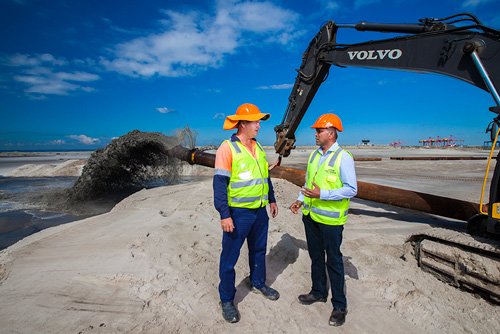Dredging and dredge material management
Project Title: Beneficial reuse of dredge material
With the future increase in ship length, the public debate surrounding dredging and the risk of flood events, it is possible there will be an increased frequency and volume of dredge material that requires disposal. Beneficial reuse options that accelerate dewatering from soft material terrestrial placement will allow increased material processing rates. This project aims to identify economically viable reuse options of dredge material and, in particular, the soft estuarine mud material, and to trial recommended options where suitable.
For further information on study options please contact: Dr Alex Scheuermann (a.scheuermann@uq.edu.au).
Project Title: Place dredging works in context with natural sediment processes in Moreton Bay
Coastal sediment transport processes are complex, often driven by different key mechanisms (tides, waves, wind) which occur over different time and spatial scales and are dependent on the predominant particle type, e.g. non-cohesive sand or cohesive mud. This project aims to investigate the level of natural sediment movement within Moreton Bay (including extreme weather events) to identify the scale of wind and tidal driven resuspension of sediments within Moreton Bay. This will include current profiling, wave environment and turbidity logging from key sites throughout Moreton Bay.
For further information on study options please contact: Dr Remo Cossu (r.cossu@uq.edu.au).
Project Title: Impact of ocean disposal of dredge material on benthic infauna
Ecological health of estuaries is intimately linked to sediment behaviour, and this has economic consequences including effects on commercial fishing, spread of disease in commercial oyster culture, recreational fishing and diving, and flow-on effects to tourism. It is critically important to understand the magnitude and severity of dredge placement effects not in isolation, but compared to the range of other influences on estuaries, and then to be able to trace these to their short- and long-term biological consequences. This project aims to research the impact of smothering and water quality impacts on benthic infauna in the Mud Island Disposal Ground, and determine recovery rates of benthic infauna following dredge material placement.
For further information on study options please contact: Dr Alistair Grinham (a.grinham@uq.edu.au).
Project Title: Understand the role of coffee rock in the natural environment
The North West Channel at the entrance of northern Moreton Bay represents a future challenge to the transit of shipping as vessels have increasingly deeper drafts. This challenge is primarily due to the widespread distribution of indurated sand (coffee rock) throughout this area which has resisted dredging from trailing suction hopper dredger vessels. This project aims to research the properties of coffee rock including physical and chemical make-up; determine whether dredging changes the properties of coffee rock; and investigate the potential impacts of coffee rock plumes on the environment.
For further information on study options please contact: Dr Alistair Grinham (a.grinham@uq.edu.au).

